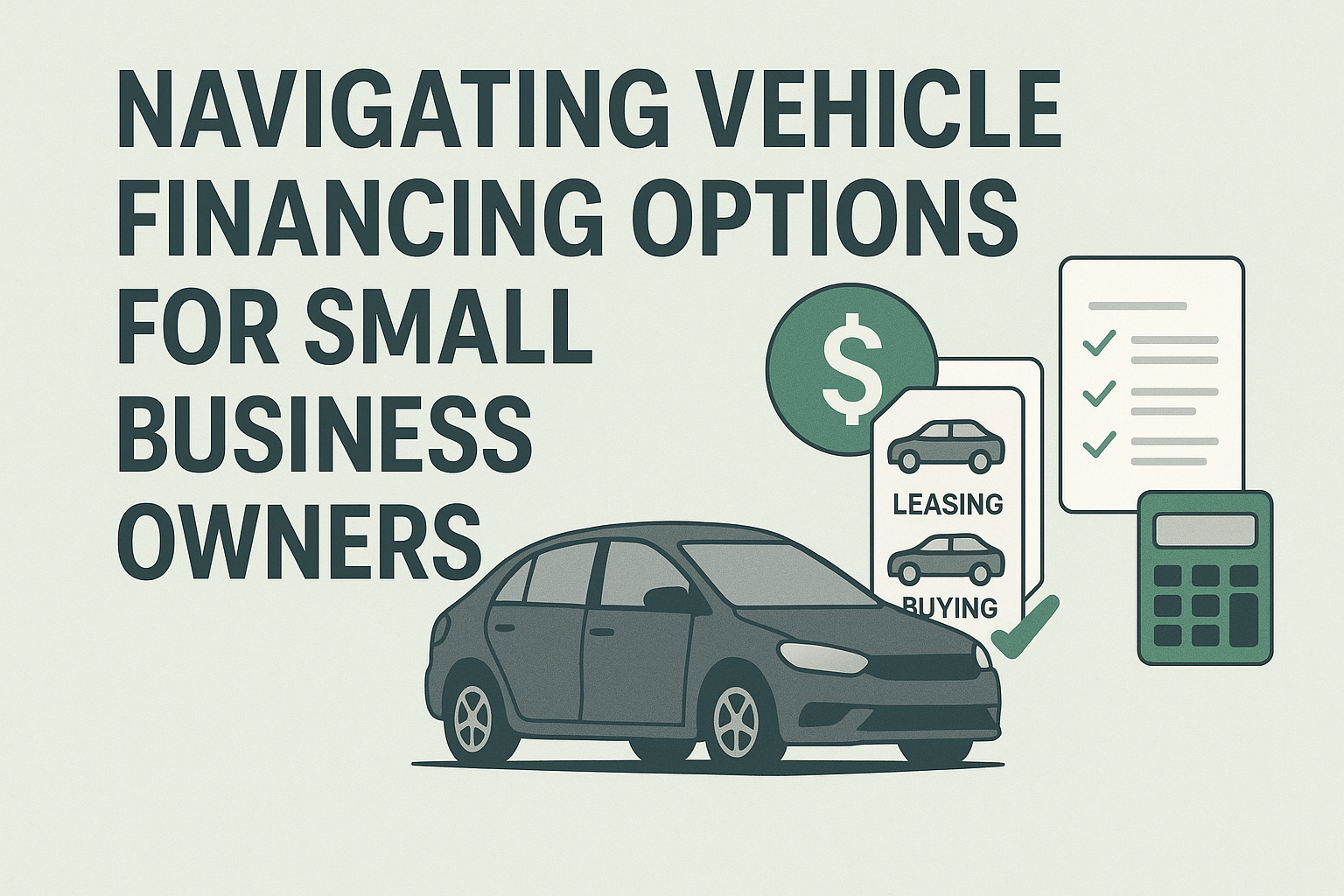Navigating the world of vehicle financing can be daunting for small business owners, but understanding your options can empower you to make informed decisions that support your business growth.
Whether you’re looking at a business loan, a commercial vehicle loan, or an auto loan for business, each option has its own set of benefits and requirements. As a small business owner, it’s crucial to assess which financing route aligns with your specific needs and goals.
In this guide, we’ll break down various vehicle financing solutions, offering insights and tips to help you secure the best possible terms for your business. Let’s explore how these options can enhance your operations and drive your business forward.
Note: You can get your free PDF guide on tips for getting a business loan below.
Understanding Vehicle Financing Basics
Before diving into specific loan options, it’s essential to grasp the fundamentals of vehicle financing. This section will cover key terms, the role of credit scores, and how to compare different loan types.
Key Vehicle Financing Terms
Principal refers to the initial amount borrowed, while interest is the cost of borrowing money. The Annual Percentage Rate (APR) combines the interest rate and fees, giving you a clearer picture of the total cost.
Loan term is the duration of your loan, typically expressed in months. A longer term can lower monthly payments but may result in paying more interest over time.
Down payment is the initial amount you pay upfront. A larger down payment can reduce your loan amount and potentially secure better terms.
Collateral is an asset used to secure a loan. In vehicle financing, the vehicle itself often serves as collateral.

Importance of Credit Scores
Your credit score plays a crucial role in vehicle financing. It’s a numerical representation of your creditworthiness, typically ranging from 300 to 850.
Lenders use this score to assess risk and determine loan terms. A higher score often leads to better interest rates and more favorable terms.
For small business owners, both personal and business credit scores may be considered. Improving your credit score before applying for a loan can significantly impact your financing options.
Regular credit monitoring and responsible financial habits can help maintain a good credit score.
Comparing Loan Types
When considering vehicle financing, it’s essential to understand the different loan types available. Each has its features and benefits.
-
Traditional bank loans often offer competitive rates but may have stricter requirements.
-
Online lenders can provide quick approvals but might have higher interest rates.
-
Credit unions typically offer favorable terms to members but may have limited vehicle selections.
Consider your specific needs, credit situation, and business goals when comparing loan types.
Business Loan Options
Business loans can be a versatile option for financing vehicles, offering flexibility in how you use the funds. Let’s explore the primary sources of business loans.
Traditional Bank Loans
Traditional banks offer a range of business loan products that can be used for vehicle financing. These loans often come with competitive interest rates and flexible terms.
Banks typically require a strong credit history and may ask for collateral. The application process can be more rigorous, involving detailed financial documentation.
One advantage of bank loans is the potential for building a long-term banking relationship, which can be beneficial for future financing needs.
However, approval times can be longer, and qualification criteria may be stricter compared to other lending options.
Online Lender Options
Online lenders have become increasingly popular for small business financing, including vehicle loans. They often offer a streamlined application process and quick funding.
These lenders may be more flexible with credit requirements, making them accessible to businesses with less-than-perfect credit scores.
Interest rates from online lenders can be higher than those from traditional banks, reflecting the increased risk and convenience.
Many online lenders specialize in specific industries or loan types, potentially offering tailored solutions for your business needs.
Be sure to carefully review the terms and fees associated with online loans, as they can vary significantly between lenders.
Credit Union Benefits
Credit unions are member-owned financial institutions that often provide competitive rates on business loans, including those for vehicle financing.
As non-profit organizations, credit unions may offer more personalized service and flexible terms compared to large banks.
Membership is typically required to access credit union services, often based on geographic location or affiliation with specific groups.
Credit unions may have lower fees and more lenient credit requirements, making them an attractive option for small business owners.
However, credit unions might have limited resources compared to larger banks, potentially affecting their range of services or loan amounts.
Auto Loan for Business
Auto loans for business purposes can be an effective way to finance vehicles for your company. Let’s examine the key aspects of these loans.
Secured vs. Unsecured Loans
Secured loans use the vehicle as collateral, often resulting in lower interest rates and better terms. The lender can repossess the vehicle if you default on the loan.
Unsecured loans don’t require collateral but typically have higher interest rates. They may be harder to qualify for and often have lower loan amounts.
Secured loans are more common for vehicle financing due to the built-in collateral. They can be a good option for businesses with firm credit profiles.
Unsecured loans might be preferable if you want to avoid putting your vehicle at risk or if you’re borrowing a small amount.
Consider your business’s financial situation and risk tolerance when choosing between secured and unsecured loans.
Pros and Cons of Leasing
Leasing can be an alternative to purchasing a vehicle outright. It often requires lower monthly payments and allows for regular vehicle upgrades.
However, leasing means you don’t own the vehicle at the end of the term. There may also be mileage restrictions and wear-and-tear charges.
Pros of leasing:
-
Lower monthly payments
-
Ability to drive newer vehicles
-
Potential tax benefits
Cons of leasing:
-
No ownership equity
-
Mileage restrictions
-
Potential extra fees at lease end
Leasing can be beneficial for businesses that need to maintain a modern fleet or those with limited capital for large down payments.
Evaluating Loan Terms
When considering an auto loan for your business, it’s crucial to evaluate all aspects of the loan terms.
Key factors to consider include:
-
Interest rate
-
Loan duration
-
Down payment requirements
-
Prepayment penalties
-
Fees
Look beyond the monthly payment to understand the total cost of the loan over its entire term.
Consider how the loan terms align with your business’s cash flow and long-term financial goals.
Don’t hesitate to negotiate terms or shop around with multiple lenders to find the best deal for your business.
Commercial Vehicle Loan Choices
Commercial vehicle loans are specifically designed for business use, often with terms tailored to the needs of companies. Let’s explore the key considerations in this category.
Financing New vs. Used Vehicles
When choosing between new and used vehicles for your business, consider factors beyond just the purchase price.
New vehicles often come with warranties and the latest features but depreciate quickly. Used cars can offer significant savings but may have higher maintenance costs.
Your choice should balance your budget, business needs, and long-term cost projections.
Leasing Commercial Vehicles
Leasing can be an attractive option for businesses needing commercial vehicles. It often requires less upfront capital and allows for regular fleet updates.
Benefits of commercial vehicle leasing include:
-
Lower monthly payments
-
Easier budgeting with fixed costs
-
Ability to upgrade vehicles more frequently
Potential drawbacks include:
-
No ownership equity
-
Mileage restrictions
-
Potential fees for excessive wear and tear
Leasing can be particularly beneficial for businesses in industries where having the latest vehicle models is essential.
Tax Implications
Understanding the tax implications of vehicle financing is crucial for making informed decisions.
For purchased vehicles, you may be able to deduct depreciation expenses. The specific method and amount can vary based on the vehicle type and use.
Interest paid on vehicle loans is often tax-deductible as a business expense.
Leased vehicles may offer different tax advantages, potentially allowing you to deduct the entire lease payment as a business expense.
Consult with a tax professional to understand how different financing options could impact your business’s tax situation.
Small Business Vehicle Loan Strategies
Securing favorable terms on a small business vehicle loan requires careful planning and execution. Let’s look at strategies to improve your chances of success.
Building a Strong Application
A strong loan application can significantly improve your chances of approval and favorable terms.
Key elements of a strong application include:
-
Detailed business plan
-
Comprehensive financial statements
-
Strong credit history (both personal and business)
-
Clear explanation of how the vehicle will benefit your business
Prepare all necessary documentation in advance, including tax returns, bank statements, and financial projections.
Consider including information about your industry experience and business track record to strengthen your application.
Be prepared to explain any past financial issues and how you’ve addressed them.
Negotiating Loan Terms
Don’t be afraid to negotiate loan terms with potential lenders. Many aspects of a loan offer can be negotiable.
Areas you might negotiate include:
-
Interest rate
-
Loan duration
-
Down payment amount
-
Prepayment penalties
-
Fees
Research current market rates and terms to have a baseline for negotiations.
Be prepared to explain why you deserve better terms, highlighting your business’s strengths and potential.
Consider getting offers from multiple lenders to use as leverage in negotiations.
Managing Loan Repayments
Effective management of your loan repayments is crucial for maintaining good credit and financial health.
Set up automatic payments to ensure you never miss a due date.
Consider making extra payments when possible to reduce the overall interest paid and potentially pay off the loan early.
Keep detailed records of all payments and loan-related communications for tax purposes and financial planning.
Regularly review your loan terms and consider refinancing if you can qualify for better rates or terms in the future.
If you encounter financial difficulties, communicate with your lender proactively to explore options like payment deferrals or loan modifications.




